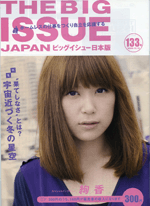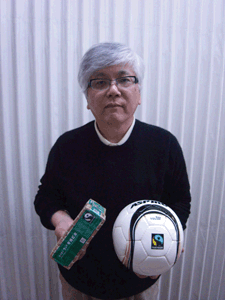The Big issue
 Anyone who lives in, or has visited, one of Japan’s urban centers has probably seen street vendors selling copies of The Big Issue. Unfortunately, it seems that many people still don’t know what this influential magazine stands for. Launched in England in 1991, The Big Issue seeks to provide homeless and vulnerably housed individuals the opportunity to earn a legitimate income. It is written by professional journalists and supported in part by corporate sponsors… and you! Homeless individuals receive ten copies for free and purchase each additional issue for 140 yen. Readers then purchase them for 300 yen and the profits go to the vendor. The Big Issue operates in several countries around the world and takes additional steps to help vendors regain control of their lives through The Big Issue Foundation. Providing vendors a job and getting them off the streets is just a first step. Homelessness is not merely a result of joblessness, but often many other factors, some beyond the individual’s control. The foundation offers counseling on housing, health, personal finance and addiction. Vendors must go through training and sign a strict code of conduct, which can be viewed on the website. Vendors are identifiable by badges with their photo and vendor number. On the Japanese website, there is a list of all the vendors in Japan for that particular month. Click on the vendor number, and the individual’s photograph and story appear. These narratives—there are over 100 of them—are brutally honest, heartbreaking and yet also hopeful because you see homeless who have found the will to try to re-establish a decent life. The site also lists the locations of the vendors and the times they are usually active. The Big Issue in Japan is in Japanese, but even if you don’t read Japanese, it is still worth buying a copy. Give it to one of your colleagues or friends who does read Japanese but might not know about the magazine’s work. Or show it to your company’s CSR department. Purchasing copies is just one way you can help. The Big Issue Japan Foundation offers a wide range of options, from becoming a supporting member, a volunteer or corporate sponsor. Visit their websites for more detailed information. www.bigissue.jp (Japan) |
日本の都市圏部に住む人や行くことがある人なら、街頭に立ちビッグイシューを売る人を見かけたことがあるだろう。しかし残念なことに、この雑誌の影響力が及ぼす意味を理解している人は少ない。 ビッグイシューは、ホームレスや住まいがあるもののかなり生活基盤が脆弱な人々に、適切な収入を得る機会を提供しようという目的で1991年に英国で始まった。記事はプロのジャーナリストが執筆し、一部企業のスポンサーそして読者のあなた!からの支援によって成り立っている。ホームレスの人達は最初にこの雑誌10冊を無料で受け取り、その売り上げを元手に以後は一冊140円で仕入れる。購読者には300円で販売し、残りが彼らの収入となる仕組みになっている。 ビッグイシュー事業は、世界中の様々な国で展開されており、ビッグイシュー基金を通じて、元の生活を取り戻せるよう取り組みが行われている。しかし街頭販売の仕事を提供し、路上生活から脱するのは、最初の一歩にすぎない。ホームレスという状態は、単に仕事にあぶれて住むところがなくなったという短絡的な結果ではなく、個人の裁量を超えた様々な要因が絡まっている。そこで基金では住宅管理、医療相談、金銭管理や依存症の相談支援をしている。 販売者になるためには、研修を受け、行動規範に同意しなければならない。規範はウェブサイトで閲覧することができる。販売者は、顔写真入りの販売者番号の入った身分証明書をつけて身元を分かるようにしている。日本版のウェブサイトでは、その月の販売者全員の写真を掲載しており、販売者番号をクリックすると、それぞれの写真と彼らのストーリーを見ることができる。彼らの物語は、100件以上掲載されており、残酷な程に正直で心が痛む。しかしそれでもここに希望を見つけることができる。これからがんばって生活を取り戻し、慎ましやかに生きていきたいという彼らの意欲を見て取ることができるからだ。ウェブには販売者の担当エリアや販売時間も明記している。 日本のビッグイシューは日本語で書かれているが、日本語が読めなくても買う価値は十分にある。日本語の読める同僚や友人にプレゼントをしてはどうだろう、もしかしたらこの雑誌のことを知らないかもしれない。それか勤務先のCSR部署に見せてみるのも一案だ。 |
Fair Trade Topics: Interview with Rev. Matsuki Suguru (Director, Wakachiai)
|
K: When did you start Wakachiai? MS: In February of 1992, I traveled around Europe for about three weeks and went to a Fairtrade shop in Germany, where I bought some coffee and tea. In August, our church had a general meeting and we decided to start selling Sri Lankan tea. That German shop introduced us to the producers. But it wasn’t until Spring of 1993 that we began to sell things with the Fairtrade label attached. K: What kind of work did you do before launching Wakachiai? MS: Until then I had been involved in education about developing countries. I had published three picture books by children from third-world countries, but selling books is quite an undertaking. I realized I should buy products from developing countries and present those along with educational materials and other information. I had some money from sales of the books, so I started buying products with that. K: Was Wakachiai the first Japanese Fairtrade shop? MS: No. There was a place called “The Third-World Shop” in 1986. A man named Kataoka Masaru opened it. I remember seeing it on the news, thinking, “wow, somebody’s doing this in Japan?” but I didn’t think at the time that I would be doing it myself. K: Why did you originally go to Europe? MS: I actually went to America for three weeks as well, but I wanted to learn a little more about aid activities, ODA and Fairtrade. Between 1986 and 1990, I worked in the National Christian Council of Japan office, where I was responsible for international aid and fundraising activities, so I had a natural interest in those things. K: Right now, there are quite a number of Fairtrade companies operating in Japan. What do you think of them? MS: I’ve done quite a bit to introduce the Fairtrade label into Japan. The more that familiarity with that label increases, the more that developing countries will benefit. So I hope that these companies will attach the label to whatever products meet the Fairtrade standard, and introduce them widely in Japan. www.wakachiai.com |

K: いつから「わかちあい」をはじめましたか? MS: 1992年の2月にヨーロッパを3週間かけて回りました。その時にドイツでフェアトレードショップに立ち寄り、コーヒーと紅茶を買いました。その後、8月に私たちの教会の総会がありスリランカの紅茶を売ることになったのですが、その紅茶がそのドイツのショップが紹介してくれた紅茶でした。そういった経緯を経て、正式にフェアトレードのマークを付けて売り始めたのは93年の春です。 K: 「わかちあい」を設立する前にどんな活動をしましたか? MS: それまでは開発教育に関わりました。発展途上国の子供の絵本を3冊出版しましたが、売るのが大変なので、発展途上国の製品を買ってそれと同時に教育的な情報も提供しようと思いました。絵本を売った残りのお金があったので、それを使ってフェアトレード製品を仕入れました。 K: 「わかちあい」は日本で初めてのフェアトレードショップでしたか? MS: いいえ、1986年にできた第三世界ショップというお店がありました。 始めたのは片岡勝さんという方です。店を開いた情報をニュースで見て、へぇ、日本でもこういうことをやるんだ、と思っていましたが、その時に自分がやることになるとは思いませんでした。 K: どうしてヨーロッパへ行かれたのですか? MS: 実際にアメリカにも3週間ぐらい行きましたが、援助活動とODAとフェアトレードを少し学ぼうと思ったのです。1986年から90年まで日本キリスト教協議会の事務所で国際協力や資金集めをやっていたので、そういうことに興味がありました。 K: 現在、日本にはフェアトレード会社がたくさんあります。そういった会社に対してはどう思いますか? MS: 私はいろんなきっかけで世界のフェアトレード認証ラベルを日本に紹介しました。そのラベルを日本に普及させることは、その発展途上国の支援と繋がっているわけです。ですから、フェアトレードの基準にできたものにラベルを付けて日本に広く紹介してほしいですね。 www.wakachiai.com |








